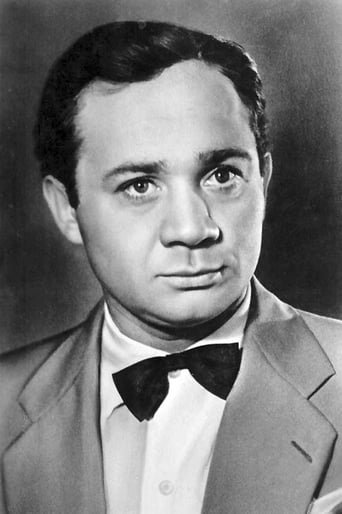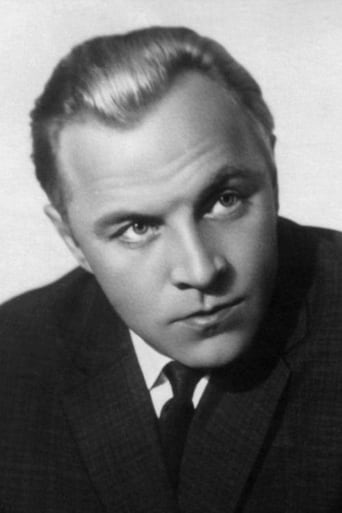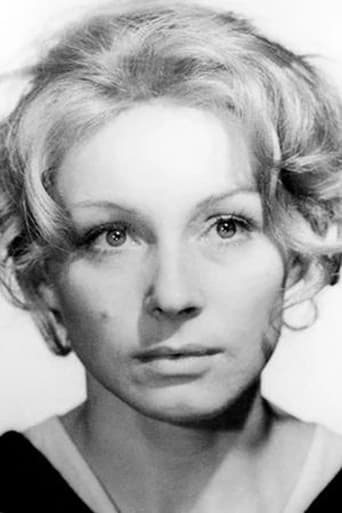Spoonatects
Am i the only one who thinks........Average?
WillSushyMedia
This movie was so-so. It had it's moments, but wasn't the greatest.
Ella-May O'Brien
Each character in this movie — down to the smallest one — is an individual rather than a type, prone to spontaneous changes of mood and sometimes amusing outbursts of pettiness or ill humor.
Fleur
Actress is magnificent and exudes a hypnotic screen presence in this affecting drama.
Max Nemtsov
One of the soviet cinema masterpieces, and it passes the test of time rather well. I watched the film version as a kid, and it was impressive, but this, extended, version, re-edited for West German TV to almost twice the movie length (over 400 minutes, sliced into 5 episodes) is even better for there are less holes in continuity. Alov & Naumov, production designers, and the brilliant cinematographer Valentin Zheleznyakov in the mid-1970s did what Peter Greenaway achieved somewhat later—they made Dutch and Spanish classic painting come alive, creating the total illusion of immersing in the believable (albeit mythological) period as perceived and depicted by Masters.Although the cast is the all-star band of soviet cinema of that period (with, again, believable faces, unlike the present day actors' well-fed mugs), the voice-overs are atrocious, intonations false and theatrical, and the dialogue stilted and unnatural. This, however, with time is perceived as the conventionality, and all attention is paid to the visuals. Even the human effigy of Byelokhvostikova (Nele) is very watchable, 'cause she, of course, has an almost ideal face (but a bad actress nevertheless). As for the design and picture, again, it's like watching a living painting, and I wish there were a guide somewhere, explaining to broad public what art masterpieces were used as inspirations where (I could see a lot but not all of them, of course, I'm not that visual myself).Another minor shortcoming is that some scenes seem to be rather bloated time-wise, but, again, this might be our impression nowadays, after all the extra-fast editing of contemporary blockbusters. And, don't forget, soviet viewers needed all the explanation one could offer them. In order to feel the pain and rage of the character, watch all 10 minutes of him being tortured on the wheel, bitches.
Livia
This TV miniseries is based on the book "La légende et les aventures héroïques, joyeuses et glorieuses d'Ulenspiegel et de Lamme Goedzak au pays de Flandres et ailleurs", by belgian XIX century author Charles de Coaster, which, in turn is based on the popular German renaissance text "Ein kurzweiliges Buch von Till Eulenspiegel aus dem Lande Braunschweig", by Hermann Bote. The story is set at the time of religious wars and turmoils following the protestant reformation and the hero fights for the freedom of his country from Spanish occupation and from the holy inquisition. The fist parts of the film are devoted to showing the atmosphere of oppression in the Netherlands at the time, with people being reported to the inquisition by envious neighbors and burned at the stake on flimsy excuses, when the real goal is for the king to get hold of their riches. Obviously this must have been a "hot theme" for soviet citizens even in the seventies, and it might be the reason why the film is so effective, though I wonder how it passed censorship. The whole film is spectacularly shot, in the tradition of the best Russian film-making, but probably the most monumental scene is at the end, when Til drives a ship into a flooded town. This film is probably very hard to come by, unless you live in one of the ex-socialist countries, but if you do manage to see it you won't regret it.
sunlion
The movie is based on the book. It graphically tells a story of a couple of orphans who grew up in Flemish town at a time of which burnings in a thick dirty air of suspicion, fear and everpresent chance to get caught and tortured and killed with or without reason. The movie is enormously atmospheric, grim and realistic. It emerges the viewer in a cold unhospitable, lonely world of small, frightened, bigoted people, who are ready to tell on anybody else just to get out themselves, of highstanding cruel egoistic rich, and among this - small light sparkles of people who are able to see through the thick smoke of hate and stagnation.Filmed in a perfectly authentic surroundings, in an old town. In the leading role is Lembit Ulfsak, who later appeared as Paganel in "Searching for captain Grant".




